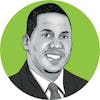 See
more of the story
See
more of the story
When I started the Mary Ann Key Book Club two years ago — with the support and partnership of the Star Tribune, the Hennepin County Library and Friends of the Hennepin County Library — I hoped that a group named after my great-great-great-grandmother might lend a voice to the unheard: BIPOC folks who are often viewed as a monolith instead of communities filled with individuality, depth and complexity.
Mary Ann Key was an enslaved woman in the 1840s and '50s who would sometimes, as she aged, sing to her grandchildren about the places she'd longed to see again. It's a feeling Javier Zamora, author of "Solito," can understand. The talented writer documented his journey from El Salvador to the United States through the eyes of a 9-year-old boy who had to overcome a series of challenges that changed his life and perspective. That's why "Solito" is an impeccable selection for our fifth book in the Mary Ann Key Book Club.
On Thursday at 7 p.m., the Mary Ann Key Book Club will host a "A Community Discussion of 'Solito' " with a distinguished panel, featuring leaders within the local Latino community: Fernanda Acosta, an activist, community planner and climate organizer; Susana De Leon, an immigration attorney and the director of Kalpulli KetzalCoatlicue, a community-based traditional Aztec dance circle; and Teresa Ortiz, a spoken-word poet and adult basic education manager at CLUES, Minnesota's largest Latino-led nonprofit.
And then, on Tuesday at 6:30 p.m., the Mary Ann Key Book Club will host a conversation with Zamora at Minneapolis Central Library's Pohlad Hall, an event that will be both in-person and online.
I had the honor of speaking with Zamora ahead of our community panel and author events. Here is a snippet of that conversation:
Q: How did you go back and channel the experiences of a 9-year-old boy to write this book?
A: A lot of editing, but also a lot of trusting. I suffered this trauma when I was a little kid, so a level of my own personality has kind of stayed as a child. And it takes me a lot … to trust people and to allow that 9-year-old to come out when I meet strangers. But if you talk to my friends who have known me for years, or even my wife, I am very childlike still. And that is directly due to what I described in the book. And so it was hard for me to reveal that to the world and to trust that I could be myself on the page and to pull that off. And all of this was also editing, but also therapy. A lot of the therapy sessions about writing this book were just my therapist telling me to trust my memories and to trust my instincts and to trust myself.
Q: You named this book "Solito," which means "alone." Why did you name it that and did you consider other titles?
A: They always ask for a page of titles that you think are appropriate for the book. And I can't even remember any of them because they were all terrible. But what moved my wife — my wife is my first editor — and what moved my agent, who is my second editor, was this paragraph [near] the beginning when I'm in a coastal Guatemala border town and I am the kid — meaning me — and I say something like, "I feel alone." And that is the first time that I don't have any family members around, not even my Grandpa.
Q: I always believe we, as writers, pick an audience when we write. Who did you write this book for?
A: Primarily for myself. This is a story I didn't even want to tell myself … Therapy just helps you cope with that. I wanted to forget that kid for 20 years. That's why I never talked about him, and I never talked about any of the people he saw or the things that he witnessed. I didn't want to go there because I thought if I went there I made him real, but I didn't want any of the things to be real. And what [my therapist] said is, "Why not? If this kid is not going to go away, why not get to know him? Why don't you talk to him? Why don't you learn to love him?" And so in writing this book, I have learned to be there for him. I have learned how cool he was, how superhuman that kid was in order to survive. And I've really gotten to know him, and in a sense … that "him" is me.
Myron Medcalf is a local columnist for the Star Tribune and a national writer and radio host for ESPN. His column appears in print on Sundays twice a month and also online.





